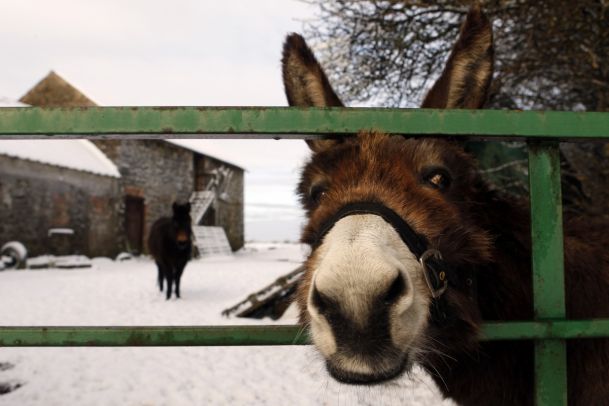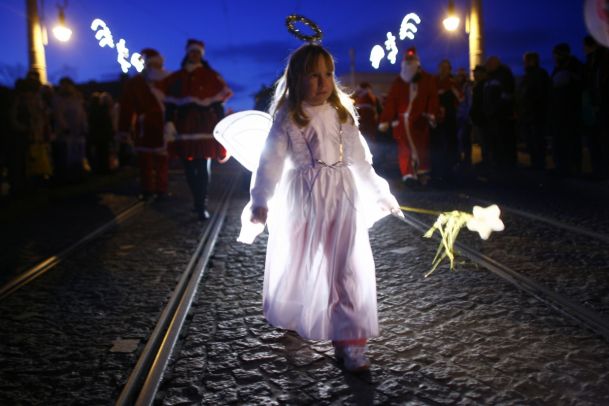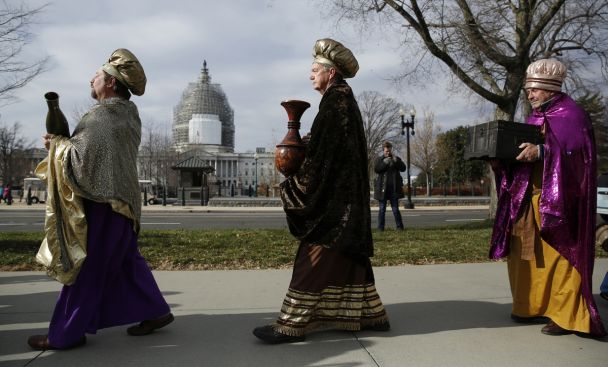No Innkeeper, No Donkey - 10 things we get wrong about the Christmas story
Everyone loves a nativity play. Hundreds of parents, crammed into a boiling hot school hall desperately straining for a glimpse of their little darling's landmark role as 'third camel.' It's a wonderful festive tradition, and of course, an important way of passing the 'true meaning of Christmas' down from generation to generation. However, while the meaning might be communicated well, there's an awful lot about the average nativity play that isn't exactly... truth.
The Bible doesn't go into anywhere near the detail we might imagine about the birth of Jesus. There are a only a few short passages given over to the story - and the Gospels of Mark and John don't even mention it. Because we've got so little to go on then, some traditional conjecture has grown up around the story, and has now become as central to Christmas as the absolutely true story of Rudolph the red-nosed reindeer. Here are ten examples of how we've added an awful lot of legend to the biblical account - and some of them may surprise you...
1. Mary probably didn't ride on a donkey

It's possible – although disputed – that a middle-class pregnant woman travelled 80 miles to Bethlehem on a donkey. Other popular means of transport at the time included horse, camel, and a cart drawn by an animal. Importantly though, the Bible never mentions the 'little donkey' of Christmas folklore – only that Mary and Joseph travelled from Nazareth to Bethlehem together (Luke 2:4-5). As the father of a one-time nativity donkey, I appreciate the gravity of what I'm suggesting there.
2. It almost certainly wasn't a stable
The Bible doesn't actually mention a stable, or a barn, or a cave - only a manger (in Luke 2:7). We do read that she laid him in this feeding trough because there was no room for him elsewhere in the place they were staying, but most scholars suggest that this was a guest room in the home of some of Joseph's relatives. After all, if he was travelling back to his home town, isn't it a bit weird to suggest he'd have found a stable for the birth instead of looking up his Uncle Brian?
3. There's no innkeeper
Similarly, the innkeeper is a function of the story dreamt up to a) make sense of the stable story and b) ensure a suitable role for Charlie Farrington in Year Two who likes shouting 'no!' No inn, and no keeper are mentioned in the biblical account, although apparently the confusion can be traced back to a mistranslation of the Greek word kataluma, which as we all know actually means 'guest chamber.'
4. Jesus wasn't silent
It's a lovely carol, but Away in the Manger's claim that 'the Little Lord Jesus, no crying he makes' is romantic nonsense. Jesus was fully human; fully a baby, and as any parent of small children will tell you, that means he will have regularly screamed down the neighbourhood, especially when he had wind. Although I appreciate that the line 'The little Lord Jesus, a bit windy he is', probably wouldn't have been such a roaring success.
5. The random animals
Love Actually's lobster and Octopus-filled Christmas play takes things on to another level, but even the traditional wooden nativity set is factually questionable. There's no suggestion in the Gospels that Mary and Joseph had to accommodate animals as well as their feeding trough, but due to other mentions of oxen and donkeys in the Bible (Isaiah 1:3 and Habakkuk 3:2 among them), the animals too became part of the tradition.
6. No Angels

..or at least, there's no biblical mention of angels at the place where Jesus was born. Given that the miracle of the incarnation was taking place and defining the future of human history, it's probably safe to assume some sort of angelic presence – but possibly not one that was visible to Mary and Joseph. This school nativity cast list is getting worryingly short.
7. The angels didn't sing to the shepherds as Jesus was born
The Christmas carol-fuelled idea that a heavenly host appeared and sang to the shepherds as they washed their socks isn't a million miles off... except that the Bible doesn't actually mention singing. Luke 2:9-12 sees an angel appearing and speaking to the shepherds, and v13 tells us that a 'host' of angels then appear, praising God. But the text says they're 'saying', not singing, Glory to God in the highest. It's a bit less showbiz of course.
8. They weren't kings (riding camels)

'We Three Kings of Orient Are' – a Christmas song that doesn't get past its opening line before collapsing into factual inaccuracy. These men clearly weren't kings; their deferential engagement with King Herod tells us that, and more importantly, the Bible actually refers to them as 'Magi' - wise astronomer/astrologers, which is perhaps why God spoke to them through the stars. There's also no reference in the Bible to their camels (three more members of Year One shuffle sadly off stage).
9. There weren't three of them
Three seems to be an arbitrary number assumed on the basis of the three kinds of gifts given to Jesus. In fact all we get from the scripture is that there was more than one of them – which would have meant two, or indeed six (come back those three members of Year One).
10. They weren't there at the time
This is perhaps the most interesting and common misconception of all. If Christmas cards and hand-carved nativity sets were to be believed, the Magi are all part of the glorious tableau of the stable scene. In fact, the Magi didn't visit Jesus as a baby at all – they appeared at least a year later, because their arrival triggers Herod's tragic massacre of infants under two. They also didn't follow the star... they simply noted its ascent (Matthew 2:2).
I'm worried now that I've ruined everyone's Christmas. But here's the good news: Jesus really was born – whether in a cave, stable or guest room – in Bethlehem 2,000 years ago. As The Message puts it, God "became flesh and blood, and moved into the neighbourhood." And while some of the details of how that happened have become blurry or romanticised, that definitive kernel of truth remains both the heart of Christmas, and the key to the meaning of life itself. Merry Christmas.
Martin Saunders is an author, screenwriter and the Deputy CEO of Youthscape. Follow him on Twitter @martinsaunders











